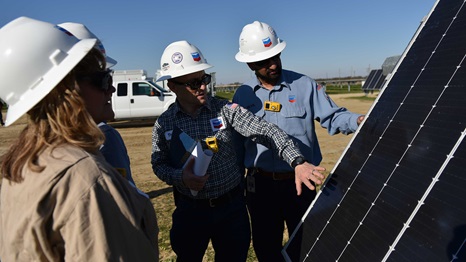emissions solutions
laying the foundation to realize carbon capture’s potential
2 min read | march 27, 2024
Chris Powers, Chevron’s vice president of CCUS, speaks on a panel at CERAWeek.
Carbon capture, utilization, and storage (CCUS) is one way to help the world meet its lower carbon energy goals. Helping it succeed at scale will require innovation, partnership and policy.
That was the message Chris Powers, Chevron’s vice president of CCUS, gave at CERAWeek 2024.
why it matters
According to climate and energy experts, CCUS is an essential tool to help lower the world’s carbon intensity.
“We’re making progress every day toward developing ever-cleaner energy that’s also affordable and reliable. CCUS is needed to meet the goals of the Paris Agreement. It will be key in lowering the carbon intensity of harder-to-abate sectors like refining, power and cement.”
innovation and collaboration
chris powers
vice president of CCUS
One way to work together is through policy. The right regulatory frameworks can help scale up this technology.
“Expansion depends on a stable and supportive policy environment,” Powers said. “Reliable, long-term market incentives, public infrastructure investments and streamlined permitting can dramatically accelerate growth.”
experience matters
Chevron has decades of experience with CCUS projects, including:
- The Gorgon Project in Australia, one of the world’s largest carbon capture and storage systems.
- The Bayou Bend Project in the Texas Gulf Coast.
- Svante’s carbon capture pilot project in California (Cooperative Agreement No. DE-FE0031944).
topics covered
related content
-

 hydrogen facility to be a chevron first
hydrogen facility to be a chevron firstour operationsfebruary 29, 2024
-

 chevron CEO discusses the future of energy
chevron CEO discusses the future of energyemissions solutionsjanuary 20, 2025
-

 novel ideas, established companies key to advancing lower carbon tech
novel ideas, established companies key to advancing lower carbon techemissions solutionsjanuary 14, 2025
-

 chevron CEO talks growing production, efficient spending
chevron CEO talks growing production, efficient spendingemissions solutionsdecember 18, 2024
chevron email updates
Subscribe to our newsletter to receive news and updates.



